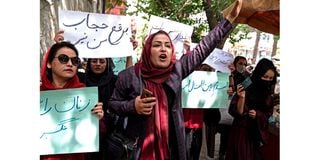Taliban takeover: A year on, women's rights violation worse

Members of Afghanistan's Powerful Women Movement, protest against the Taliban's order for women to cover fully in public, including their faces in Kabul on May 10, 2022.
What you need to know:
- Women in Afghanistan hold no cabinet positions, the Ministry of Women’s Affairs was abolished, effectively eliminating their right to political participation.
- Girls have been banned from attending school past the Sixth Grade.
- Women have been barred from working most jobs outside the home.
On August 15, 2021, the Taliban took over the reins of power in Afghanistan after ousting the Western-backed government that had run the country for 20 years.
Since then, the violation of human rights against women and girls in the country continues to worsen.
Women in the country currently hold no cabinet positions in the de facto administration, which has also abolished the Ministry of Women’s Affairs, effectively eliminating their right to political participation.
Girls have been banned from attending school past the Sixth Grade and women have been barred from working most jobs outside the home.
The women are also required to remain in their homes except in cases of necessity when they should cover their faces in public places.
They have also been banned from travelling long distances without a male chaperone. Those not accompanied are also increasingly being denied access to essential services.
Raised concerns
The rights’ violations have elicited global condemnation with human rights and gender activists calling on the Taliban administration to end the ongoing discrimination.
UN Women Executive Director Sima Bahous has raised concerns over the ongoing war in Afghanistan saying there is continuous deterioration of Afghan women and girls’ situations.
Ms Bahous, in a statement, noted the violations have spanned every aspect of their human rights, from living standards to social and political status.
“Decades of progress on gender equality and women’s rights have been wiped out in mere months,” said Ms Bahous.
The UN Women boss noted the deliberate slew of measures of discrimination against Afghanistan’s women and girls is a terrible act of self-sabotage for a country experiencing huge challenges, including climate-related, natural disasters and exposure to global economic headwinds that left some 25 million Afghan people in poverty and many hungry.
“Afghanistan is the only country in the world where girls are banned from going to high school. There are no women in the Taliban’s cabinet, no Ministry of Women’s Affairs, thereby effectively removing women’s right to political participation. The exclusion of women from all aspects of life robs the people of Afghanistan of half their talent and energies. It prevents women from leading efforts to build resilient communities and shrinks the county's ability to recover from the crisis,” she said.
Open schools
She called on the authorities to open schools for all girls, remove constraints on women’s employment and their participation in politics, and revoke all decisions and policies that strip them of their rights including ending all forms of violence against women and girls.
When the group took over, it had promised that women would be allowed to exercise their rights within Sharia law, including the right to work and to study.
Despite this assurance, however, the Taliban has systematically continued to exclude women and girls from public life.
UN Women estimates that the restrictions on women’s employment is estimated to have resulted to an economic loss of up to USD 1 billion – or up to five per cent of Afghanistan’s GDP.
Ms Bahous said her organisation is scaling up the provision of life-saving services for women in the country to meet overwhelming needs.
She added they are also supporting women-led businesses and employment opportunities across all sectors to help lift the country out of poverty.
The UN agency is also investing in women-led civil society organizations to support the rebuilding of the women’s movement.





